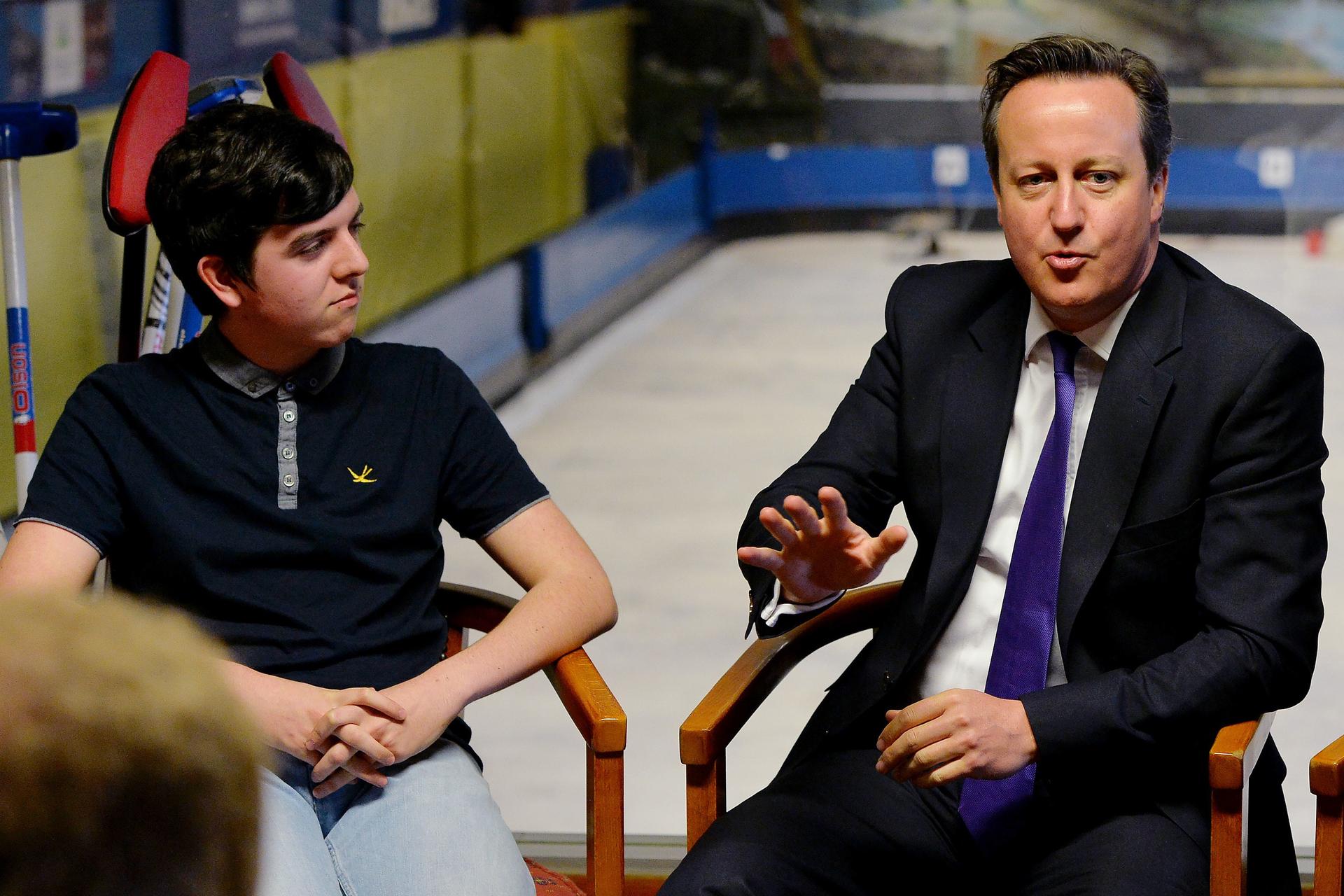TV debates might be too American for UK elections
Tough sell: Cameron talks to first-time voters in Scotland.
LONDON, UK — The big debate right now in the lead-up to the elections here on May 7 is whether to have a debate.
Prime Minister David Cameron ceded a point this week when he essentially refused to go head-to-head with Labour Party leader Ed Miliband.
Cameron said he’s only willing to take part in a single 90-minute, seven-sided debate with leaders from the top political parties before the campaign officially starts. (This happens 25 working days before the election, when the prime minister dissolves Parliament.)
This has produced two responses from the British political classes.
The first is that debates are an American-style distraction that Cameron is wise to avoid.
The second is that Cameron is — bwak bwak BWAK! — a chicken.
“I’ll debate him, any time, any place, anywhere. He should stop ducking and weaving and he should name the date,” Miliband said. “I want these debates. I want them to happen.”
Cameron agreed to a TV debate before the last election in 2010 against then-Prime Minister Gordon Brown. It wasn’t much of a gamble. Brown was famously dour and unpopular.
That was Britain’s first-ever televised debate between party leaders before a general election. The public liked it. Almost half of first-time voters said it helped them decide their vote, according to Leeds University political communication professor Stephen Coleman.
This time around, it’s a bigger risk. The race looks close, and debates typically favor outsiders over incumbents. Miliband has his own PR problems, but he’s pretty good in front of a crowd.
“I haven’t put hurdles in the way,” Cameron said Thursday, sounding testy. “If we hold the debates in the campaign, we won’t talk about anything else. We’ll only talk about the debates.”
Here’s what could happen:
1. Leaders of the seven top political parties all debate each other, and that’s it
Cameron has agreed to just one of the broadcasters’ suggested debates: a 90-minute discussion between the leaders of the Conservatives, Labour, the Liberal Democrats, Green Party, UK Independence Party, the Scottish National Party and the Welsh nationalist party Plaid Cymru.
Remember, none of the people onstage would be asking for a direct vote as prime minister. They are asking people to vote for a local parliamentary representative from their party. The leader of the party holding the most seats would then likely be named prime minister.
Anyone who has watched a US primary debate — or that great 2010 New York gubernatorial debate where Jimmy McMillan of the Rent Is Too Damn High Party wore those gloves — knows that the more candidates there are onstage, the less time there is for any of them to seriously challenge another’s position.
The media and viewers at home don’t have much to focus on besides quirks and gaffes. This usually works in favor of front-runners and against long-shot candidates. (Of course, sometimes they work against themselves.)
2. The seven-sided debate happens, plus Miliband debates Deputy Prime Minister Nick Clegg as the government’s representative
Clegg is leader of the Liberal Democrats, the centrist, libertarian-leaning group that partners in a coalition government with Cameron’s Conservatives.
Clegg’s not impressed with Cameron’s decision either. This may not be the happiest political marriage.
“It’s as if they [the Conservatives] think they’re ordering a drink in the drawing room of ‘Downton Abbey,’ telling everybody else what they should do. It’s not for one party to grandly tell everybody else what’s going to happen,” Clegg complained on LBC radio. “If David Cameron is too busy and too important to defend the record of this government, then I offer myself.”
3. Miliband goes Clint Eastwood-style and debates an empty chair
No, seriously. Ultimately, it’s the broadcasters’ decision to hold a debate. If one party declines its invitation, the debate will still go on with the absence noted, a clause known as “empty chairing.”
There won’t be an actual empty chair on stage, though. As we all learned at the 2012 US Republican National Convention, that doesn’t go well.
More from GlobalPost: 5 things to know about the UK elections
We want to hear your feedback so we can keep improving our website, theworld.org. Please fill out this quick survey and let us know your thoughts (your answers will be anonymous). Thanks for your time!
